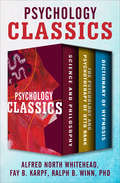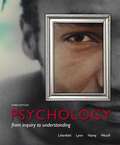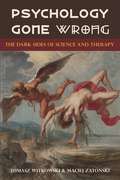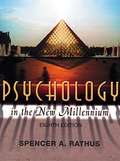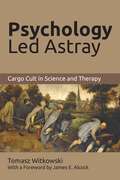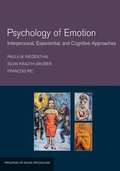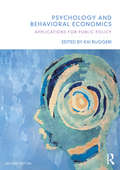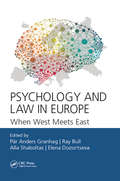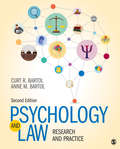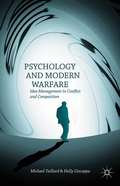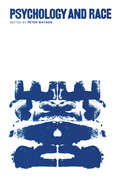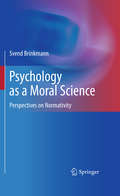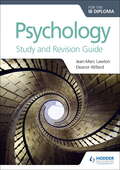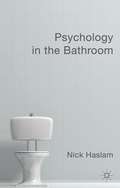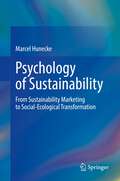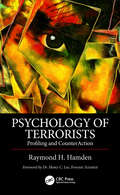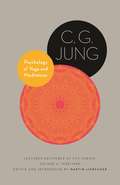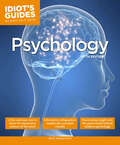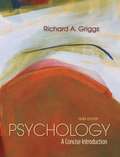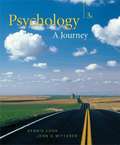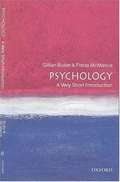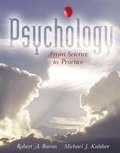- Table View
- List View
Psychology Classics: Science and Philosophy, The Psychology and Psychotherapy of Otto Rank, and Dictionary of Hypnosis
by Alfred North Whitehead Ralph B. Winn Fay B. KarpfThree classic texts in one: essays by Alfred North Whitehead, an authoritative study of Otto Rank, and an essential reference book on hypnosis. In Science and Philosophy, Alfred North Whitehead presents his mature thought on topics ranging from education to science and mathematics; from the theories of John Dewey to Albert Einstein. These collected essays cover his positions in a deep and extraordinarily unified way. Austrian psychologist Otto Rank is one of the most influential figures of modern psychotherapy. A protégé́ of Sigmund Freud, he made significant developments in the fields of analysis, psychotherapy, counseling, education, and social work. In The Psychology and Psychotherapy of Otto Rank, social psychologist Fay B. Karpf—who studied with Rank—presents an authoritative analysis of his pioneering work and legacy.Dictionary of Hypnosis has been an essential text on the subject since its first publication in 1965. Written by psychology professor Dr. Ralph B. Winn, this wide-ranging reference book provides a substantial amount of information on the history of hypnosis and its various uses in contemporary medicine, psychology and other sciences.
Psychology From Inquiry to Understanding, Third Edition
by Scott O. Lilienfeld Nancy J. Woolf Laura L. Namy Steven Jay LynnProvides students with the tools they need to go from inquiry to understanding.<P> Psychology: From Inquiry to Understanding, 3/e provides the framework students need to go from inquiry to understanding by continuously modeling the application of the six key principles of scientific thinking. The text teaches students how to test their assumptions, and motivates them to use scientific thinking skills to better understand the field of psychology and the world around them.<P> MyPsychLab is an integral part of the Lilienfeld / Lynn / Namy / Woolf program. Key learning applications include writing assessment, MyPsychLab video series, and simulations.<P> This text is available in a variety of formats – digital and print. Pearson offers its titles on the devices students love through Pearson’s MyLab products, CourseSmart, Amazon, and more.<P> Teaching & Learning Experience<P> This program will provide a better teaching and learning experience -- for you and your students. Here's how:<P> * Personalize Learning – MyPsychLab is an online homework, tutorial, and assessment program. It helps students prepare for class and instructor gauge individual and class performance.<P> * Improve Critical Thinking – Numbered learning objectives and section summaries help readers build critical thinking and study skills.<P> * Engage Students – Visual activities, such as labeling of figures and completion of summary tables, help students review key concepts.<P> * Explore Research – “Apply Your Scientific Thinking Skills” questions are tied to outside research assignments.<P> * Support Instructors – Support Instructors—A full set of supplements, including MyPsychLab, provides instructors with all the resources and support they need.<P>
Psychology Gone Wrong: The Dark Sides of Science and Therapy
by Tomasz WitkowskiPsychology Gone Wrong: The Dark Sides of Science and Therapy explores the dark sides of psychology, the science that penetrates almost every area of our lives. It must be read by everyone who has an interest in psychology, by all those who are studying or intend to study psychology, and by present and potential clients of psychotherapists. This book will tell you which parts of psychology are supported by scientific evidence, and which parts are simply castles built on sand. This is the first book which comprehensively covers all mistakes, frauds and abuses of academic psychology, psychotherapy, and psycho-business.
Psychology In The New Millennium, 8e
by Spencer A. RathusThis best-selling text not only explores psychological theory and research, but also emphasizes their application to the lives of students. Spencer Rathus is a talented author with a widely celebrated writing style that makes psychology interesting, appealing, and relevant for students. A great amount of detail has gone into updating this text, including: the additions of a new chapter, "Adolescent and Adult Development;" a new feature, "Controversy in Psychology," which embraces controversies in psychology as vehicles for enhancing knowledge and stimulating critical thinking; and a new pedagogical approach, PQ4R (outlined below). This new edition also features greater emphasis on the evolutionary perspective, as well as a new connection to the Web and the text's CD-ROM using the author's trademarked method.
Psychology Led Astray: Cargo Cult in Science and Therapy
by Tomasz WitkowskiThis book shows how scientific and psychotherapeutic practices change into worthless rituals called by the famous physicist, Richard Feynman, "cargo cult." It is a must-read for everybody who is interested in psychology, who is studying or intends to study it, but also for present and potential clients of psychotherapists and parents of mentally-disabled children. Readers will learn which parts of psychology and therapy are cargo-cult-like and which are reliable. This book is the second part of trilogy devoted to the dark side of psychology.
Psychology Of Emotion: Interpersonal, Experiential, And Cognitive Approaches
by Paula M. Niedenthal Silvia Krauth-Gruber François RicThis textbook discusses fundamental issues in the definition and measurement of emotion, including: conscious and unconscious processes; the ways in which emotions arise in, and are constrained by, social situations and social processes; the regulation and sharing of emotion and their effects of mental health; and the manner in which culture (including subculture) shapes or moderates some of these processes. The book also focuses on the component processes of emotion, their functions, and the ways in which these interact with the social environment. Rather than deny either that emotions are biologically determined or that they are culturally created or shaped, both biology and social situation are treated as important forces in the elicitation and the experience of emotion. Each section of the book is structured around specific approaches or models, and the precise questions that they were constructed to address. The theories and models are also placed in their in historical context. Discussion of the different approaches is elaborated by summaries of the extant scientific evidence, as well as examples of specific experiments or studies that were designed to evaluate the question. Timely, engaging real-world examples are used from a variety of international contexts. The pedagogic features, including concise introductions and summaries, discussion questions, and suggested readings, have been incorporated into the volume, making this an ideal text for a course of Emotion, which can be found as an option within many social psychology and cognitive psychology courses.
Psychology and Behavioral Economics: Applications for Public Policy
by Kai RuggeriPsychology and Behavioral Economics offers an expert introduction to how psychology can be applied to a range of public policy areas. It examines the impact of psychological research for public policymaking in economic, financial, and consumer sectors; in education, healthcare, and the workplace; for energy and the environment; and in communications. Your energy bills show you how much you use compared to the average household in your area. Your doctor sends you a text message reminder when your appointment is coming up. Your bank gives you three choices for how much to pay off on your credit card each month. Wherever you look, there has been a rapid increase in the importance we place on understanding real human behaviors in everyday decisions, and these behavioral insights are now regularly used to influence everything from how companies recruit employees through to large-scale public policy and government regulation. But what is the actual evidence behind these tactics, and how did psychology become such a major player in economics? Answering these questions and more, this team of authors, working across both academia and government, present this fully revised and updated reworking of Behavioral Insights for Public Policy. This update covers everything from how policy was historically developed, to major research in human behavior and social psychology, to key moments that brought behavioral sciences to the forefront of public policy. Featuring over 100 empirical examples of how behavioral insights are being used to address some of the most critical challenges faced globally, the book covers key topics such as evidence-based policy, a brief history of behavioral and decision sciences, behavioral economics, and policy evaluation, all illustrated throughout with lively case studies. Including end-of-chapter questions, a glossary, and key concept boxes to aid retention, as well as a new chapter revealing the work of the Canadian government’s behavioral insights unit, this is the perfect textbook for students of psychology, economics, public health, education, and organizational sciences, as well as public policy professionals looking for fresh insight into the underlying theory and practical applications in a range of public policy areas.
Psychology and Law in Europe: When West Meets East
by Pär Anders Granhag, Ray Bull, Alla Shaboltas and Elena DozortsevaOffering carefully curated articles from the European Association of Psychology and Law (EAPL), this book features chapters from a truly international group of scholars. This text is the first of its kind to offer insights into current developments in psychology and law in Russia. The field of psychology and law has a very long and strong tradition in Russia, but very little is known, as Russian scholars rarely publish their works in English. The volume also contains state-of-the-art chapters on topics at the very core of psychology and law, including offender profiling, lie detection, crime linking, false memories, and witness interviewing. Features Provides rare insight into Russian history of forensic and criminal psychology Covers core topics in the discipline Offers international scope from a diverse array of contributors Psychology and Law in Europe: When West Meets East is a text of interest for students of psychology, law, or criminal justice, as well as scholars and practitioners in the field. This text offers a window into global advances in psychology and law.
Psychology and Law: Research and Practice
by Anne M. Bartol Curtis R. Bartol"I like the use of research and citations throughout the text. It is more comprehensive than my current text and does a much better job of presenting the scientific evidence." —Kathy McGuire, Western Illinois University Written by authors with extensive experience in the field and in the classroom, Psychology and Law: Research and Practice, Second Edition, offers the definitive perspective on the practical application of psychological research to the law. Curt R. Bartol and Anne M. Bartol emphasize the various roles psychologists and other mental health professionals play in criminal and civil legal matters. Topics such as family law, mental health evaluations, police interrogation, jury selection and decision making, involuntary civil commitment, and various civil capacities are included. The authors also emphasize the major contributions psychological research has made to the law and encourage critical analysis through examples of court cases, high-profile current events, and research. This comprehensive book examines complex material in detail and explains it in an easy-to-read way. New to the Second Edition: The new edition has been significantly reorganized to more closely align with the progression through the court system. A new chapter on children, adolescents, and criminal law (Chapter 8) provides students with information on adjudicative competence, comprehension of constitutional rights, and eyewitness identification and courtroom testimony. New feature boxes include case studies, research projects, and contemporary topics with discussion questions for classroom debate. Additional court cases and statutes have been integrated into chapters to emphasize the important role psychology plays in the legal process. The content is applied to real cases such as the Masterpiece Cakeshop case and the Dassey confession (comprehending Miranda). Over 300 recent research findings on topics related to psychology and law highlight cutting-edge research studies that help students understand what research does and prompt them to discuss the methodology and results. New pedagogical tables clearly illustrate complex information around ethical issues, APA amicus briefs, strengths and weaknesses of simulation studies, insanity standards within the states, effects experienced by survivors of traumatic incidents, and more. Increased coverage of contemporary issues encourage critical thinking and active learning by promoting discussions around current issues such as telepsychology, neuropsychology, adversarial allegiance, and actuarial instruments used in bail and sentence decision-making.
Psychology and Law: Research and Practice
by Anne M. Bartol Curtis R. Bartol"I like the use of research and citations throughout the text. It is more comprehensive than my current text and does a much better job of presenting the scientific evidence." —Kathy McGuire, Western Illinois University Written by authors with extensive experience in the field and in the classroom, Psychology and Law: Research and Practice, Second Edition, offers the definitive perspective on the practical application of psychological research to the law. Curt R. Bartol and Anne M. Bartol emphasize the various roles psychologists and other mental health professionals play in criminal and civil legal matters. Topics such as family law, mental health evaluations, police interrogation, jury selection and decision making, involuntary civil commitment, and various civil capacities are included. The authors also emphasize the major contributions psychological research has made to the law and encourage critical analysis through examples of court cases, high-profile current events, and research. This comprehensive book examines complex material in detail and explains it in an easy-to-read way. New to the Second Edition: The new edition has been significantly reorganized to more closely align with the progression through the court system. A new chapter on children, adolescents, and criminal law (Chapter 8) provides students with information on adjudicative competence, comprehension of constitutional rights, and eyewitness identification and courtroom testimony. New feature boxes include case studies, research projects, and contemporary topics with discussion questions for classroom debate. Additional court cases and statutes have been integrated into chapters to emphasize the important role psychology plays in the legal process. The content is applied to real cases such as the Masterpiece Cakeshop case and the Dassey confession (comprehending Miranda). Over 300 recent research findings on topics related to psychology and law highlight cutting-edge research studies that help students understand what research does and prompt them to discuss the methodology and results. New pedagogical tables clearly illustrate complex information around ethical issues, APA amicus briefs, strengths and weaknesses of simulation studies, insanity standards within the states, effects experienced by survivors of traumatic incidents, and more. Increased coverage of contemporary issues encourage critical thinking and active learning by promoting discussions around current issues such as telepsychology, neuropsychology, adversarial allegiance, and actuarial instruments used in bail and sentence decision-making.
Psychology and Modern Warfare
by Michael Taillard Holly GiscoppaThroughout history, both military and commercial entities around the world have utilized these methods, and even since the formalization of psychological operations during WW2 our methods have improved greatly, but we are still only touching the 'tip of the iceberg', so to speak, of what is truly possible.
Psychology and Race
by Peter WatsonSince the problems of race relations are worldwide, the international origins and perspectives of this excellent and timely book are especially advantageous. More research has been done in the United States than elsewhere on the psychology of race relations, so it is appropriate that a plurality of the chapters of this book are by American authors--a stellar group that includes leading contributors to our contemporary knowledge of the topic. Contributors from the English-speaking Commonwealth countries are next in number, followed by authors from the United Kingdom, where race-related issues have only recently become a salient concern of politics and social ethics. The editor has assigned topics to his carefully chosen author-experts not by country or region, but by matching the expertise of each author against a need for coherent analysis of the important aspects of aepsychology and race.'Psychology and Race is divided into two major parts. The first half of the book looks at the interracial situation itself. The first section concentrates on the majority or dominant group, and describes the development and measurement of racial awareness and prejudice and techniques for reducing prejudice; the second section focuses on the reactions of subordinate or minority groups; and the third deals with specific aspects of interpersonal interaction-attitudes, behavior, and performance--when the people concerned are of different races. The book also looks at those areas of life where race is relevant and where psychology can help in an understanding of the situation.The scope of this volume, the distinction of its authors, and the hardheaded sense of reality it brings to the discussion of these extremely complex issues will make it an invaluable resource not only for teachers and students but also for everyone concerned in any way with this most pressing issue of our times.
Psychology as a Moral Science
by Svend BrinkmannWhat does morality have to do with psychology in a value-neutral, postmodern world? According to a provocative new book, everything. Taking exception with current ideas in the mainstream (including cultural, evolutionary, and neuropsychology) as straying from the discipline's ethical foundations, Psychology as a Moral Science argues that psychological phenomena are inherently moral, and that psychology, as prescriptive and interventive practice, reflects specific moral principles. The book cites normative moral standards, as far back as Aristotle, that give human thoughts, feelings, and actions meaning, and posits psychology as one of the critical methods of organizing normative values in society; at the same time it carefully notes the discipline's history of being sidetracked by overemphasis on theoretical constructs and physical causes--what the author terms "the psychologizing of morality." This synthesis of ideas brings an essential unity to what can sometimes appear as a fragmented area of inquiry at odds with itself. The book's "interpretive-pragmatic approach": * Revisits core psychological concepts as supporting normative value systems. * Traces how psychology has shaped society's view of morality. * Confronts the "naturalistic fallacy" in contemporary psychology. * Explains why moral science need not be separated from social science. * Addresses challenges and critiques to the author's work from both formalist and relativist theories of morality. With its bold call to reason, Psychology as a Moral Science contains enough controversial ideas to spark great interest among researchers and scholars in psychology and the philosophy of science.
Psychology for the IB Diploma Study and Revision Guide
by Eleanor Willard Jean-Marc LawtonExam board: International BaccalaureateLevel: IB DiplomaSubject: PsychologyFirst teaching: September 2017First exams: Summer 2019Encourage students to achieve their best grade by simplifying and focussing exam preparation with full syllabus coverage, practical exam tips and practice questions. · Ensure thorough exam preparation with full coverage of the syllabus including concise revision notes and clear explanations of the requirements and topics. · Focus on related vocabulary with key terms highlighted for each topic/sub-topic.· Give examples of what is required to achieve the best grades with examiner advice and tips, including the common mistakes to avoid.· Reinforce understanding and consolidate learning and exam focus with Exam Practice Questions.
Psychology for the IB Diploma Study and Revision Guide
by Eleanor Willard Jean-Marc LawtonExam board: International BaccalaureateLevel: IB DiplomaSubject: PsychologyFirst teaching: September 2017First exams: Summer 2019Encourage students to achieve their best grade by simplifying and focussing exam preparation with full syllabus coverage, practical exam tips and practice questions. · Ensure thorough exam preparation with full coverage of the syllabus including concise revision notes and clear explanations of the requirements and topics. · Focus on related vocabulary with key terms highlighted for each topic/sub-topic.· Give examples of what is required to achieve the best grades with examiner advice and tips, including the common mistakes to avoid.· Reinforce understanding and consolidate learning and exam focus with Exam Practice Questions.
Psychology in the Bathroom
by Nick HaslamPresenting cutting-edge science in a playful manner, this exploration of a topic that has been veiled by taboo, the psychology of excretion, surveys an assortment of embarrassing processes, shameful disorders and disgusting habits taking the reader on a tour of the history and literature of elimination.
Psychology of Sustainability: From Sustainability Marketing to Social-Ecological Transformation
by Marcel HuneckeThis book analyzes key findings and developments of psychology for sustainable development. The starting point is a discussion of the established literature of environmental psychology in regards to which factors influence environment-related behavior. Afterwards, the author discusses strategies and interventions that can promote sustainable behavior. It is very important that in order to increase the effectiveness of environmental psychological interventions, these must be first contextualized socially. Furthermore, interventions that aim to bring about a socio-ecological transformation should also focus on the goal of subjective well-being. Overall, the findings of environmental psychology are brought together with theories from positive psychology and the approach of psychological resources from positive psychology and the approach of psychological resources from health psychology to answer the question: How can the socio-ecological transformation of a consumer society be supported by an inner transformation of human beings. An answer to this question is provided by the promotion of six psychological resources for sustainable lifestyles: mindfulness, capacity for pleasure, self-acceptance, self-efficacy, construction of meaning and solidarity can both promote individual well-being and increase motivation for sustainable behavior.
Psychology of Terrorists: Profiling and CounterAction
by Raymond H. HamdenThe Psychology of Terrorists examines the personality profile of the individual and categorizes the psychology of terrorists into four distinct profiles which are outlined and analyzed in detail. There are many books that cover social psychology and political violence and aggression, but few establish the mind-set of the terrorist as an individual. This includes taking into account personal experiences, and religious or political ideology for the purposes of understanding conceptual and tactical objectives and profiling terrorists to counter terrorist threats. <P><P>Dr. Raymond Hamden presents a unique look at terrorists as individuals with personal motives as well as those of principle. The book presents an analysis of terrorists without prejudice or bias for any political, religious, nationality, creed, or race. Too many times the world see experts focus on issues that are based on their own predispositions or partialities. Although there is criticism on the reliability of profiling, this research demonstrates validity and reliability. It is vital to understand terrorist motivations and this can only be achieved by "knowing" the terrorists' psychological character, looking at the individual terrorist, taking into account particular experiences, psychological makeup, background, and fundamentalist ideology. <P><P>The Psychology of Terrorists: Profiling and CounterAction will be a welcomed addition to psychologists, terrorism researchers, criminal profilers, investigators and intelligence professionals, counter- and anti-terrorism experts, as well as military, security, and law enforcement professionals tasked with protecting individuals from the various acts of terrorism, domestically and globally.
Psychology of Yoga and Meditation: Lectures Delivered at ETH Zurich, Volume 6: 1938–1940 (Philemon Foundation Series #22)
by C. G. JungJung's lectures on the psychology of Eastern spirituality—now available for the first timeBetween 1933 and 1941, C. G. Jung delivered a series of public lectures at the Swiss Federal Institute of Technology (ETH) in Zurich. Intended for a general audience, these lectures addressed a broad range of topics, from dream analysis to the psychology of alchemy. Here for the first time are Jung's illuminating lectures on the psychology of yoga and meditation, delivered between 1938 and 1940.In these lectures, Jung discusses the psychological technique of active imagination, seeking to find parallels with the meditative practices of different yogic and Buddhist traditions. He draws on three texts to introduce his audience to Eastern meditation: Patañjali's Yoga Sûtra, the Amitâyur-dhyâna-sûtra from Chinese Pure Land Buddhism, and the Shrî-chakra-sambhâra Tantra, a scripture related to tantric yoga. The lectures offer a unique opportunity to encounter Jung as he shares his ideas with the general public, providing a rare window on the application of his comparative method while also shedding light on his personal history and psychological development.Featuring an incisive introduction by Martin Liebscher as well as explanations of Jungian concepts and psychological terminology, Psychology of Yoga and Meditation provides invaluable insights into the evolution of Jung's thought and a vital key to understanding his later work.
Psychology, Fifth Edition (Idiot's Guides)
by Joni E. JohnstonAuthored by a clinical psychologist, Idiot's Guides: Psychology, Fifth Edition, breaks down all of the complexity of the human mind. Key concepts are explained in plain and simple language, and are supplemented with insightful infographics that help explain each concept in a visual format. Readers will learn everything from the physiology of the brain to the most popular theories of modern psychology to the most famous pioneers in the field (such as Freud and Jung). From behaviorism to social psychology to cognitive psychology, readers will learn what makes all of us tick and why we are who we are.
Psychology: A Concise Introduction (Third Edition)
by Richard A. GriggsThis text explores the territory of the introductory psychology course with both brevity and clarity. Griggs draws on his classroom experience and extensive research in his choice of the core concepts in psychology.
Psychology: A Journey
by Dennis Coon John O. MittererIn a course where professors are frequently confronted by students who haven't actually read their textbooks, this text offers a solution. The shortest, most succinct of the books written by Dennis Coon, PSYCHOLOGY: A JOURNEY presents psychology in a way that sparks readers' curiosity, insights, imagination, and interest getting students "hooked" on psychology and eager to read on. The first author to integrate the proven SQ4R (survey, question, read, recite, relate, and review) active learning system into a psychology textbook, Coon helps readers grasp major concepts, develop a broad understanding of psychology's diversity, and see for themselves how psychology relates to the challenges of everyday life. Because readers become actively involved with the material, they develop a basic understanding of psychology that they take with them into their future courses and careers.
Psychology: A Very Short Introduction
by Gillian Butler Freda McmanusPsychology is part of everyone's experience: it influences the way we think about everything from education and intelligence to relationships and emotions, advertising, and criminality. People readily behave as amateur psychologists, offering explanations for what we think, feel, and do. But what exactly are psychologists trying to help us understand? What scientific grounding do they have for their approach? In Psychology: A Very Short Introduction, Dr. Gillian Butler and Dr. Freda McManus provide an understanding of some of psychology's leading ideas and their practical relevance. The authors answer some of the most frequently asked questions about psychology including: What is psychology? How do we use what is in the mind? How does psychology work? How do we influence each other? What can or can't a psychologist do for you? Psychology is a large part of our everyday experience, and this elemental guide is a stimulating introduction for anyone interested in understanding the human mind. About the series: The Very Short Introductions series offers concise and original introductions to a wide range of subjects from Buddhism to Literary Theory. Not simply a textbook of definitions, each book in the series provides trenchant, provocative, yet balanced discussions on the central issues of the field, gives a readable historical account of the subject, and demonstrates how each particular area of study has developed and shaped society. Eventually, the series will encompass every major academic discipline, offering readers an affordable, accessible, and complete reference library. Stimulating and lively, the Very Short Introductions are indispensable guides and essential reading for anyone interested in the development of these influential fields.
Psychology: A Way to Grow (Second Edition)
by Carl R. Green William R. SanfordPsychology: A Way to Grow, Revised Second Edition, introduces high school students to psychology. It provides its readers with a foundation in the basic theories and principles of psychology. It also guides students toward a greater understanding of their own capacity for personal growth.
Psychology: From Science to Practice
by Robert A. Baron Michael J. KalsherWith a strong emphasis on application-- without neglecting research and science-- this text focuses on helping students use the findings and knowledge of psychology in their own lives and careers. As the only introductory psychology text written by authors with extensive business experience, this book seeks the ideal balance between psychology' s "practical "and "scientific "sides. It highlights psychology' s scientific nature while simultaneously emphasizing its practical value-- how students can actually use and apply the material they read on the job and outside of the classroom. "Psychology: From Science to Practice" emphasizes three key goals: Make it clear to students how they can actually use the findings and knowledge of psychology in their own lives and careers. Present psychology as a science. Discuss the major findings of psychology without overwhelming students with too much detail.
